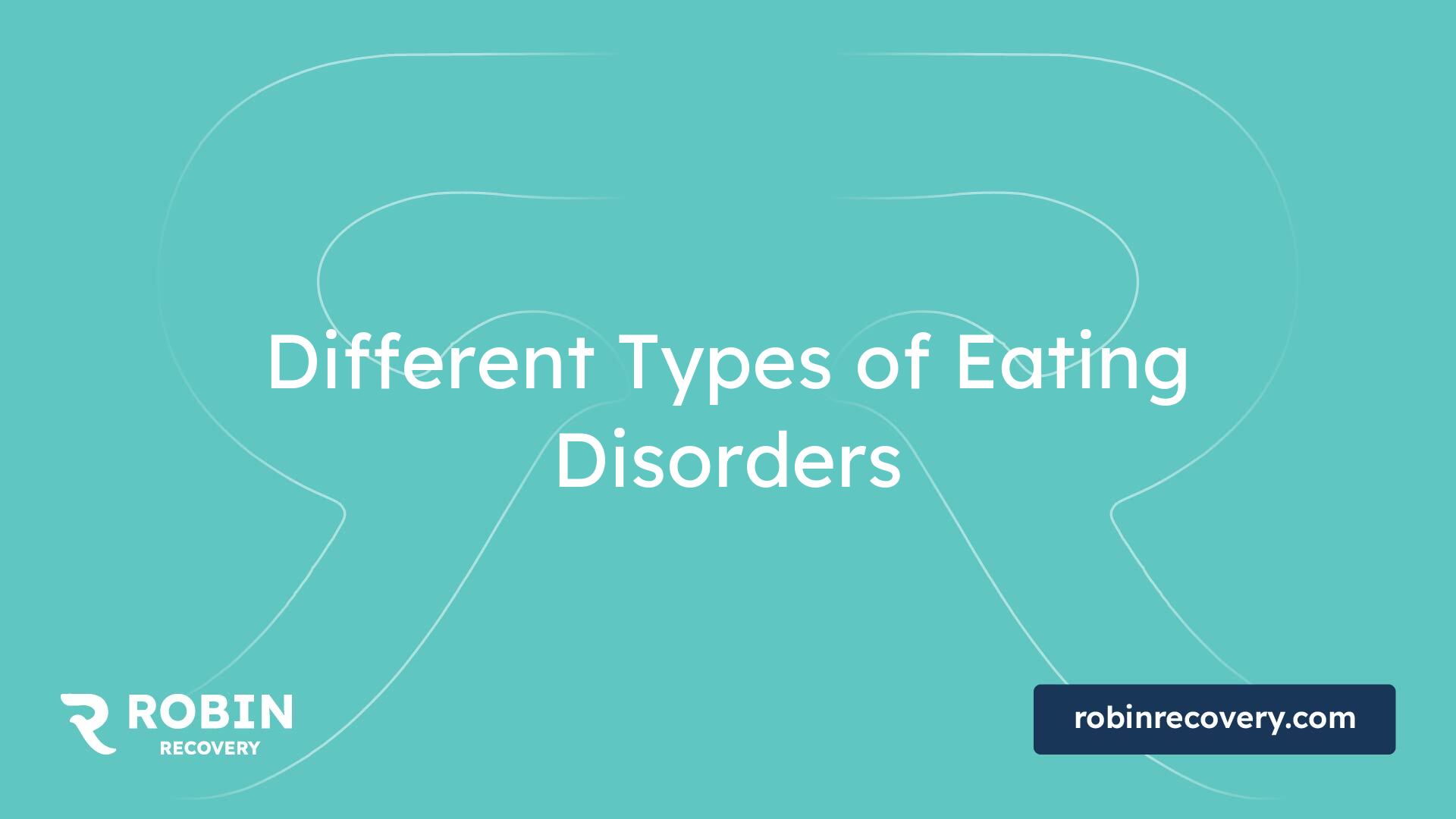Different Types of Eating Disorders

Overview of Eating Disorders

Definition and Prevalence
Eating disorders are complex mental health conditions that involve unhealthy eating habits and can have severe impacts on both physical and mental well-being. The most common types of eating disorders are anorexia nervosa, bulimia nervosa, and binge-eating disorder. These disorders can be life-threatening if left untreated.
In the United States, it is estimated that 28.8 million people will experience an eating disorder in their lifetime. This highlights the significant prevalence of these conditions and the importance of addressing them.
Eating DisorderPrevalence in Population (%)Anorexia Nervosa0.6Bulimia Nervosa1.0Binge-Eating Disorder2.8
Impact on Physical and Mental Health
Eating disorders can lead to serious physical and mental health consequences. They may affect various systems in the body and can lead to long-term problems, including malnutrition, cardiovascular issues, and metabolic imbalances. The emotional toll is equally significant, often resulting in anxiety, depression, and low self-esteem.
The impact of these disorders can be severe, leading to life-threatening situations in extreme cases. It is crucial for individuals experiencing signs of an eating disorder to seek help. Effective treatment can improve both physical health and quality of life.
For more information about the risks associated with addiction, visit articles on the dangers of cocaine and alcohol and binge drinking: why is it dangerous?. Understanding these relationships aids in recognizing the broader implications of eating disorders as part of a spectrum of addiction-related challenges.
Types of Eating Disorders

When discussing the different types of eating disorders, it is essential to understand the most common forms, which include Anorexia Nervosa, Bulimia Nervosa, and Binge-Eating Disorder. Each has distinct characteristics and impacts on individuals.
Anorexia Nervosa
Anorexia Nervosa is characterized by severe food intake restriction, intense fear of gaining weight, and a distorted body image. This disorder is officially categorized into two subtypes:
Obsessive-compulsive symptoms are often present [2]. Long-term effects can lead to severe health issues such as brain damage, gastrointestinal problems, and organ damage.
CharacteristicDetailsWeightUnhealthy low body weightFearIntense fear of gaining weightPurging BehaviorsVomiting, laxative use, excessive exerciseLong-term EffectsSevere brain damage, organ failure
Bulimia Nervosa
Bulimia Nervosa involves episodes of excessive eating, known as binge eating, followed by compensatory behaviors to avoid weight gain. This cycle is characterized by the following:
Individuals with Bulimia often alternate between periods of eating and drastically restricting their calorie intake, leading to detrimental effects on their health.
CharacteristicDetailsBingesLarge quantities of food consumed in a short timePurgingSelf-induced vomiting, laxative misuse, excessive exerciseHealth RisksElectrolyte imbalances, digestive issues
Binge-Eating Disorder
Binge-Eating Disorder is characterized by recurrent episodes of binge eating without the regular use of compensatory behaviors seen in Bulimia. Individuals with this disorder may experience feelings of loss of control during binge episodes and significant distress regarding their eating habits.
Some common features include:
CharacteristicDetailsBinge EpisodesFrequent consumption of large amounts of foodNo compensatory behaviorUnlike Bulimia, does not include purgingEmotional distressFeelings of guilt or shame after bingeing
Understanding these types of eating disorders is crucial for recognizing symptoms and seeking appropriate help. If you or someone you know might be struggling with an eating disorder, professional assistance is essential for recovery.
Additional Types of Eating Disorders
In addition to the more commonly known eating disorders, there are other types that can significantly impact individuals. Two notable examples are pica disorder and rumination disorder.
Pica Disorder
Pica is an eating disorder characterized by the consumption of non-food substances that lack nutritional value. Common items ingested may include dirt, soap, cloth, chalk, or hair. This disorder can pose serious health risks; individuals with pica may experience various complications depending on the substances ingested. In severe cases, pica can be fatal.
Some of the potential risks associated with pica include:
ComplicationsDescriptionGastrointestinal blockagesNon-food items can cause obstructions in the digestive tract.PoisoningSubstances like lead from dirt or chemicals can be toxic.InfectionsCertain items can introduce harmful bacteria into the body.
Rumination Disorder
Rumination disorder is another less recognized eating disorder, defined by the regurgitation of food. Individuals with this disorder often re-chew the regurgitated food and may either re-swallow it or spit it out. This behavior typically occurs within 30 minutes after a meal. If not addressed, rumination disorder can lead to weight loss and severe malnutrition, which can be fatal [2].
Some characteristics of rumination disorder include:
SymptomsDescriptionRegurgitationThe act of bringing back up previously ingested food.Re-chewingChewing the regurgitated food before swallowing or discarding it.Associated malnutritionProlonged rumination can lead to inadequate nutrient intake and weight loss.
Both pica and rumination disorders are significant and can have serious implications for one's health. Understanding these variations is crucial when discussing the different types of eating disorders and their effects on individuals' well-being. Those experiencing symptoms should seek professional help and support.
Concurrent Eating Disorders
Presence of Multiple Disorders
Eating disorders often do not exist in isolation; it is common for individuals to experience more than one eating disorder simultaneously. This phenomenon, known as concurrent eating disorders, can complicate diagnosis and treatment, as individuals may present a mix of symptoms from each disorder. For example, a person might have both anorexia nervosa and binge-eating disorder, leading to a range of behaviors that may change based on their varying urges and emotional states.
The complexities of concurrent eating disorders can lead to challenges in understanding the specific underlying causes and effective treatment strategies. Treatment may require a multidisciplinary approach tailored to address the specific needs of the individual. Each disorder may require different therapeutic techniques and support systems to facilitate recovery.
Common Combinations of Eating Disorders
Eating Disorder CombinationDescriptionAnorexia Nervosa + Bulimia NervosaIndividuals may restrict food intake significantly while also engaging in binge-eating and purging behaviors.Binge-Eating Disorder + Anorexia NervosaSome may experience cycles of extreme restriction alongside episodes of bingeing, leading to profound physical and emotional turmoil.Bulimia Nervosa + Binge-Eating DisorderThese individuals may alternate between bingeing and purging, alongside episodes of uncontrolled eating without purging.
Several factors contribute to the occurrence of multiple eating disorders. Individuals with anorexia nervosa may develop bulimia nervosa as a relief mechanism, resorting to bingeing and purging behaviors in response to the pressures of severe restriction. Furthermore, the symptoms and behaviors associated with one disorder can influence the development or exacerbation of another disorder.
Effective intervention often requires a comprehensive understanding of how these disorders relate to each other and to the individual's overall mental health. Seeking professional help is crucial for creating a treatment plan that addresses the complexities of co-occurring eating disorders.
Given the intricate nature of concurrent eating disorders, individuals are urged to consult healthcare professionals who can provide the necessary support and resources tailored to their unique situations. For detailed approaches on seeking help and treatment strategies, refer to the section on diagnosis and treatment of eating disorders.
Diagnosis and Treatment of Eating Disorders
Addressing eating disorders requires a comprehensive approach that encompasses both diagnosis and treatment. Understanding these processes is essential for effective management of the different types of eating disorders.
Seeking Professional Help
The diagnosis of eating disorders is based on specific symptoms and a thorough review of eating habits and behaviors. It typically involves consultation with both a health care provider and a mental health professional. Early intervention is crucial, as it can help prevent the progression of the disorder and reduce the risk of severe health complications.
Individuals experiencing symptoms of an eating disorder should seek guidance from professionals who specialize in this area. It is important for the diagnosing team to work together to create an accurate picture of the individual's conditions, allowing for a tailored treatment plan.
Treatment Approaches and Resources
The best treatment for an eating disorder often involves a collaborative approach. This includes a primary health care provider, a mental health professional, and potentially a registered dietitian [5]. Such collaboration ensures that all facets of an individual's health are addressed.
Here are key components of the treatment process:
Treatment ApproachDescriptionBehavioral TherapyTechniques such as Cognitive Behavioral Therapy (CBT) are commonly used to address the specific behaviors and thought patterns associated with each type of eating disorder.Nutritional CounselingRegistered dietitians can help individuals establish healthy eating patterns and nutritional knowledge.MedicationWhile medication is not a cure, it can be helpful in managing symptoms, particularly for bulimia or binge-eating disorder.HospitalizationIndividuals with severe health issues may require hospitalization for intensive treatment, often provided in specialized programs.
Behavioral therapies have proven effective and are often tailored to the individual's specific eating disorder, focusing on changing harmful behaviors and improving coping strategies.
For those in need of support in managing their conditions and exploring recovery tactics, various resources including local support groups, helplines, and mental health services can be beneficial. Readers may also find information on related topics helpful, including the need for drug addicts recovery or top trauma therapy types, as these resources may provide additional support for underlying issues tied to eating disorders.
Long-Term Effects of Eating Disorders
Eating disorders profoundly impact both physical and mental health. The consequences can extend far beyond the initial stages of the disorder, affecting various aspects of an individual's well-being over time.
Physical and Mental Health Consequences
The long-term effects vary depending on the specific type of eating disorder. Below are key consequences associated with the most common disorders.
Anorexia Nervosa
For more details on these effects, visit Eating Disorder Hope.
Bulimia Nervosa
For further information, check Eating Disorder Hope.
Binge-Eating Disorder (BED)
For more insights, refer to Eating Disorder Hope.
DisorderMajor Physical ConsequencesMajor Mental ConsequencesAnorexia NervosaSevere brain damage, organ damage, gastrointestinal issuesDifficulty focusing, increased anxietyBulimia NervosaTooth damage, electrolyte imbalances, heart diseaseEmotional dysregulation, anxietyBinge-Eating DisorderHigh blood pressure, Type II diabetes, gallbladder issuesCo-occurring mental health diagnoses
Statistics on Mortality Rates
The mortality rates associated with eating disorders run alarmingly high. These statistics reveal the severity and potential risks of untreated conditions.
Understanding the long-term effects and potential mortality rates of various eating disorders is crucial for awareness and early intervention. By discussing these consequences, individuals can better understand the importance of seeking help and professional treatment. For more information on diagnosis and treatment, consider reading about seeking professional help for eating disorders.
References
[2]:
[3]:
[4]:
[5]:
